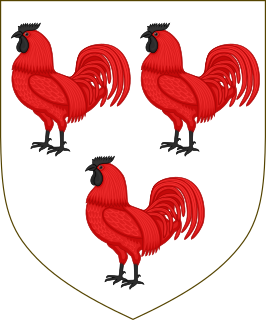Related Research Articles
Hine is a surname deriving from Middle English.

William is a male given name of Germanic origin. It became very popular in the English language after the Norman conquest of England in 1066, and remained so throughout the Middle Ages and into the modern era. It is sometimes abbreviated "Wm." Shortened familiar versions in English include Will, Willy, Willie, Bill, and Billy. A common Irish form is Liam. Scottish diminutives include Wull, Willie or Wullie. Female forms are Willa, Willemina, Wilma and Wilhelmina.
The name Haim can be a first name or surname originating in the Hebrew language, or deriving from the Old German name Haimo.
Alan is a masculine given name in the English language.
Haimo, also spelled Hamo, Heimo, Hamon, Haim, Haym, Heym, Aymo, Aimo, etc., is a masculine given name of Germanic origin. The Old French forms are Haimon, Aymon, Aimon, Aymes. It is a hypocoristic form of various Germanic names beginning with the radical haim-, meaning "home".
Jaswal is an Indian surname found among Jat Sikhs and Muslims of Punjab. It is also a clan of Rajputs that commanded the former princely state of Jaswan.

Cockayne is an English surname.

Hamnet Shakespeare was the only son of William Shakespeare and Anne Hathaway, and the fraternal twin of Judith Shakespeare. He died at the age of 11. Some Shakespearean scholars speculate on the relationship between Hamnet and his father's later play Hamlet, as well as on possible connections between Hamnet's death and the writing of King John, Romeo and Juliet, Julius Caesar, and Twelfth Night.
Hayne is a surname of English origin.
Hynes is a surname, many examples of which originate as the anglicisation the Irish name Ó hEidhin.
Acheson is a surname of Anglo-Scots origin with Norman antecedents. It derives from the pet name Atkin, which is a diminutive of Adam.

Westhampnett is a village and civil parish in the district of Chichester in West Sussex, England, located 1 mile (1.6 km) northeast of Chichester on the former A27 road, now by-passed. The village is pre-Norman and is home to many listed buildings, including the Saxon church of St Peter, where three bishops of Chichester are buried. The parish of Westhampnett includes most of Goodwood estate, its golf course, motor-racing circuit and airfield.
Gillibrand is a surname. Around 2016, 676 people bore the name in Great Britain and none in Ireland. At the time of Great Britain's 1881 census, 608 people bore the name, predominantly in Lancashire. A variant spelling is Gellibrand.
Gellibrand is a surname. For its etymology, see Gillibrand, of which Gellibrand is a variant. Around 2016, thirteen people in Great Britain bore the name, and none in Ireland. At the 1881 census of Great Britain, twelve people bore the name, located predominantly in London.
Haine is a surname.
Haimes is an English language surname.
Hannett is a surname of United Kingdom descent.

Hampnett is a small village and civil parish in Gloucestershire, England, just west of the Fosse Way. It is situated west of the junction of the A40 and A429 roads in the Cotswolds Area of Outstanding Natural Beauty. A number of springs in the village form the source of the River Leach.
Meghani is a Gujarati surname. It is judged by the Oxford Dictionary of Family Names in Britain and Ireland 'probably' to originate in the Sanskrit word मेघ combined with the adjectival suffix -ani, implying a name meaning 'to do with cloud' or, more likely, since Megha can also be a personal name, 'descended from Megha'. The dictionary notes that 'this name is also found among people from Sind, Pakistan, who have migrated into India'. The name is associated with the Lohana caste. As of about 2016, 219 people bore the name in Great Britain and none in Ireland.
Wolton or Woolton is an English toponymic surname, deriving from a place name (Woolton) in Kent or Lancashire. People with the name include:
References
- ↑ The Oxford Dictionary of Family Names in Britain and Ireland, ed. by Patrick Hanks, Richard Coates, and Peter McClure, 4 vols (Oxford: Oxford University Press, 2016), II, p. 1183 [s.v. Hamnett, and the other entries referred to there]; ISBN 978-0-19-967776-4.
- ↑ A. D. Mills, A Dictionary of English Place Names (Oxford: Oxford University Press, 1991), pp. 222, 490 (s.vv. Hampnett, Westhampnett); ISBN 9780199609086.
- ↑ The Oxford Dictionary of Family Names in Britain and Ireland, ed. by Patrick Hanks, Richard Coates, and Peter McClure, 4 vols (Oxford: Oxford University Press, 2016), II, p. 1183 [s.v. Hamnett]; ISBN 978-0-19-967776-4.